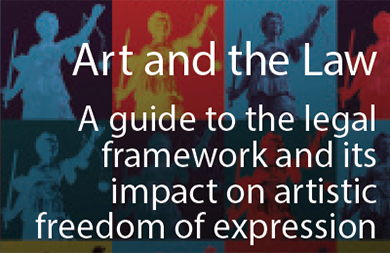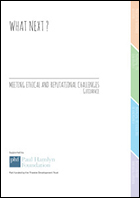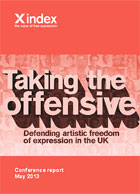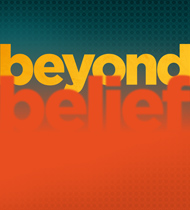16 Feb 2016 | Art and the Law Commentary, Artistic Freedom Commentary and Reports
By Daniel McClean, a lawyer and independent curator
There are few recent legal cases involving freedom of artistic expression in the UK.
In one sense, this is to be welcomed. The UK, like other western legal systems, provides wide latitude to its protection. Freedom of artistic expression is specifically incorporated as a defence into different laws. The Obscene Publications Act (1959), for example, expressly recognizes artistic merit as a defence to the publication of otherwise obscene material.
The absence of recent cases involving artistic freedom of expression in particular as a defence in criminal prosecutions to charges of obscenity, indecency, endangering public security and hate speech might suggest that we should not be too concerned about its protection (FN1) and that the courts can be called upon if required to distinguish, for example, between artistic works featuring photographs of naked children and child pornography or between plays examining religion and racist diatribe.
Yet might not the absence of case law also suggest more perversely that artistic freedom of expression is not relied upon by artists, writers, publishers, museums, galleries and theatres and by others when it should be?
The apparent absence of cases and disputes (including cases that settle prior to trial) is symptomatic of two tendencies of which we should be concerned.
The first tendency is a lack of certainty as to what scope and weight freedom of artistic expression has within the law today.
In particular, it is unclear what role artistic expression has under the general right to free expression, i.e. as protected under Article 10 of the European Convention on Human Rights (1950) and recognized in UK law through the Human Rights Act (1998)? In the UK there have seemingly been no reported cases to date where the right to freedom of artistic expression has been relied upon by claimants or defendants in the interpretation of criminal and civil statutes or in balancing against other human rights, for example, the rights to privacy or reputation.
This contrasts with the widespread (and justified) reliance on Article 10 in cases involving press freedom and communication in the public interest. It might similarly be worthwhile, for example, for there to be a challenge to the potential constraints imposed upon artistic freedom of expression by intellectual property law or the law of privacy. Artistic freedom of expression has been tested against these rights in other jurisdictions (FN2).
In the jurisprudence of the European Court of Human Rights (ECHR), there have also been few cases where the court has had to consider artistic freedom of expression.
The case of Vereinigung Bildender Kunstler v Austria (2007)(FN3) is one of the few examples. The claimant (an artists’ association based in Austria) had exhibited in Vienna’s famous Seccession gallery, a satirical painting by the artist, Otto Muhl of the *right wing, Austrian politician, Mr Meischberger* depicted in various demeaning sexual acts with the *fascist, Austrian politician*, Jorg Haider.
The Vienna court had held that Muhl’s painting had debased Meischberger’s public standing. It awarded him damages and prohibited future exhibition of the painting. The ECHR narrowly (by 4 votes to 3) found the Austrian court’s injunction to be disproportionate to the otherwise legitimate aim of protecting ‘public morals’ and awarded the artists’ association damages. In particular, it found that Muhl’s painting should carry greater weight in the balancing exercise because it was akin to a form of political satire which commented on Mr Meischberger’s public image.
As a precedent, the ECHR’s judgment vindicates artistic freedom of expression. Yet it also has narrow application. The upshot is that artistic expression has to be closely aligned to politically orientated speech if it is to trump other rights. In particular, it leaves little clue as to what weight artistic freedom of expression might have on its own terms, placing it in a limbo somewhere between political speech and less elevated commercial speech. This is to sell freedom of artistic expression short.
John Tusa (FN4) eloquently writes that ‘the arts matter,” …. “because they are universal; because they are non-material; because they deal with daily experience in a transforming way; because they question the way we look at the world; because they offer different explanations of that world … A nation without arts would be a nation that had stopped talking to itself, stopped dreaming, and had lost interest in the past and lacked curiosity about the future.”
Tusa’s point is clear: the arts are fundamental to human autonomy and social and cultural development: a society which constrains the arts is impoverished. The arts can uniquely ask probing and troubling questions about our place in the world as the ancient Greeks were only too aware in the space they carved out for tragic theatre. In this sense, some if not many forms of artistic speech might be regarded as being of equivalent importance in their own right to forms of politically orientated speech.
Of course, not all forms of so-called artistic expression do carry weight. There are many examples of trite and meretricious expression which bears the name of art, but there is no reason why the courts cannot discriminate such instances, even if this may not always be straightforward. After all, judgments about political speech also involve judgments of value. In the case of Leroy v France (2008)(FN4), the ECHR upheld the conviction by the French authorities of the claimant, a cartoonist, of the crime of apologizing for terrorism after he depicted a cartoon in the aftermath of 9/11, showing the twin towers collapsing in the terrorist attack with the caption, ‘We have all dreamed of this. Hamas has done it’. There is no reason why simple hate/offensive speech such as this should be given greater weight as artistic expression because it is framed within the context of a cartoon – even if we might disagree with the punishment afforded by the French authorities.
The second tendency is a pattern towards self-censorship that can be discerned particularly on the part of publishers and institutions to avoid communicating subject matter that carries the risk of being deemed offensive and ‘politically incorrect’ whether this subject matter is unlawful or not.
Self-censorship in this form can be exercised at two stages. The first stage is avoiding communicating such subject matter at all. It is difficult to measure such acts of self- censorship, but there is a good reason to believe these acts are becoming increasingly common as Index on Censorship uncovered in Taking the Offensive.
The second stage (which I consider here) is unnecessarily removing controversial and provocative artistic subject matter from public view (for example, abandoning a play or taking an artwork down from exhibit in a public gallery) when challenged to do so, including by the police authorities.
The Tate’s removal of Richard Prince’s iconic ‘Spiritual America’ (1983) from the exhibition ‘Pop Life’ when challenged by the UK’s Obscene Publications Unit in 2007 is a powerful example of this second type of self-censorship.
Prince’s work is an ironic appropriation (as reflected in the work’s title) of a photographic image featuring the pre-pubescent actress Brooke Shields then aged twelve which had remarkably been published earlier in Playboy magazine. Prince’s work comments on the type of society and culture in which this type of image might be made as well as on Brooke Shield’s sexualized role as child actress. Prince’s work as well as being easily available on the Internet had been widely exhibited across the world, including in prestigious venues such as the Guggenheim, New York.
Following a complaint by The Daily Mail, the Tate’s trustees had been threatened with criminal prosecution under the UK’s Protection of Children Act (1978) for exhibiting an indecent image of a child – if Prince’s work was not removed from view. They were understandably afraid –a fear compounded by conservative and misguided legal advice they had received – and complied. Yet, if the Tate’s trustees had been prosecuted under the Act, which if submitted is unlikely (FN5), it would have been able to have rely upon the ‘legitimate reason’ defence – a defence made credible by the critical and institutional reception of Prince’s work within the art world.
At the moment we stand at a crossroads in the arts where creators and institutions are uncertain of their legal rights and oppressed by the desire to avoid giving offence and breaching taboos. What is to be done?
I wish to give the example of the Photographer’s Gallery (London) decision to mount an exhibition of the photographs of the internationally renowned artist, Sally Mann, in 2010 as an illustration of the positive steps that institutions can take to confront the specter of censorship, with the help of appropriately inclined lawyers.
In 2010, the Photographer’s Gallery decided to mount an exhibition of Sally Mann’s beautiful black and white photographs ‘The Family and the Land’. Sally Mann’s exhibition included a selection of photographs taken of her children naked while playing in the landscape and in a pond in the garden of the family home. Mann is a serious international artist (like Prince) whose work has been widely exhibited and critically acclaimed. Unlike Prince’s appropriated image of the naked Brooke Shields, Mann’s photographs cannot be accurately described as being prurient.
Given the strength of the social taboo against child nudity and the Tate incident in 2007, both Mann and the Photographer’s Gallery were concerned about the potential legal implications if the exhibition were to go ahead.
The advice that my law firm to the Photographer’s Gallery was robust, though not entirely risk free. It said, in essence, that even in the unlikely event a prosecution was to be brought against the artist and gallery under the Protection of Children Act 1978, for exhibiting ‘indecent’ images of children, there would be strong grounds for resisting this prosecution under the ‘legitimate reason’ defence, including Mann’s standing as an artist and the critical reception of her work, including photographs of her children.
In the event, the exhibition was mounted and not a whiff of complaint was heard from the police authorities or even the national press.
Exhibitions like Sally Mann’s at the Photographer’s Gallery are important because they create cultural precedents. They show what can be done when creators and institutions act with courage, but also receive robust legal advice. Importantly, they enable others to build upon their actions as precedents in the future.
In contrast to Art, the Law is often represented as being black and white. Yet as lawyers know all too well, the Law is also replete with grey areas of interpretation. Like Art, the Law is not fixed, but is shaped through contestation and discussion. If the scope of artistic freedom of expression is to be protected and enlarged today, it urgently requires that its contours are debated and challenged.
16 Feb 2016
By Daniel McClean, 16 February 2016
Daniel McClean is a lawyer and independent curator
There are few recent legal cases involving freedom of artistic expression in the UK.
In one sense, this is to be welcomed. The UK, like other western legal systems, provides wide latitude to its protection. Freedom of artistic expression is specifically incorporated as a defence into different laws. The Obscene Publications Act (1959), for example, expressly recognizes artistic merit as a defence to the publication of otherwise obscene material.
The absence of recent cases involving artistic freedom of expression in particular as a defence in criminal prosecutions to charges of obscenity, indecency, endangering public security and hate speech might suggest that we should not be too concerned about its protection (FN1) and that the courts can be called upon if required to distinguish, for example, between artistic works featuring photographs of naked children and child pornography or between plays examining religion and racist diatribe.
Yet might not the absence of case law also suggest more perversely that artistic freedom of expression is not relied upon by artists, writers, publishers, museums, galleries and theatres and by others when it should be?
The apparent absence of cases and disputes (including cases that settle prior to trial) is symptomatic of two tendencies of which we should be concerned.
The first tendency is a lack of certainty as to what scope and weight freedom of artistic expression has within the law today.
In particular, it is unclear what role artistic expression has under the general right to free expression, i.e. as protected under Article 10 of the European Convention on Human Rights (1950) and recognized in UK law through the Human Rights Act (1998)? In the UK there have seemingly been no reported cases to date where the right to freedom of artistic expression has been relied upon by claimants or defendants in the interpretation of criminal and civil statutes or in balancing against other human rights, for example, the rights to privacy or reputation.
This contrasts with the widespread (and justified) reliance on Article 10 in cases involving press freedom and communication in the public interest. It might similarly be worthwhile, for example, for there to be a challenge to the potential constraints imposed upon artistic freedom of expression by intellectual property law or the law of privacy. Artistic freedom of expression has been tested against these rights in other jurisdictions (FN2).
In the jurisprudence of the European Court of Human Rights (ECHR), there have also been few cases where the court has had to consider artistic freedom of expression.
The case of Vereinigung Bildender Kunstler v Austria (2007)(FN3) is one of the few examples. The claimant (an artists’ association based in Austria) had exhibited in Vienna’s famous Seccession gallery, a satirical painting by the artist, Otto Muhl of the *right wing, Austrian politician, Mr Meischberger* depicted in various demeaning sexual acts with the *fascist, Austrian politician*, Jorg Haider.
The Vienna court had held that Muhl’s painting had debased Meischberger’s public standing. It awarded him damages and prohibited future exhibition of the painting. The ECHR narrowly (by 4 votes to 3) found the Austrian court’s injunction to be disproportionate to the otherwise legitimate aim of protecting ‘public morals’ and awarded the artists’ association damages. In particular, it found that Muhl’s painting should carry greater weight in the balancing exercise because it was akin to a form of political satire which commented on Mr Meischberger’s public image.
As a precedent, the ECHR’s judgment vindicates artistic freedom of expression. Yet it also has narrow application. The upshot is that artistic expression has to be closely aligned to politically orientated speech if it is to trump other rights. In particular, it leaves little clue as to what weight artistic freedom of expression might have on its own terms, placing it in a limbo somewhere between political speech and less elevated commercial speech. This is to sell freedom of artistic expression short.
John Tusa (FN4) eloquently writes that ‘the arts matter,” …. “because they are universal; because they are non-material; because they deal with daily experience in a transforming way; because they question the way we look at the world; because they offer different explanations of that world … A nation without arts would be a nation that had stopped talking to itself, stopped dreaming, and had lost interest in the past and lacked curiosity about the future.”
Tusa’s point is clear: the arts are fundamental to human autonomy and social and cultural development: a society which constrains the arts is impoverished. The arts can uniquely ask probing and troubling questions about our place in the world as the ancient Greeks were only too aware in the space they carved out for tragic theatre. In this sense, some if not many forms of artistic speech might be regarded as being of equivalent importance in their own right to forms of politically orientated speech.
Of course, not all forms of so-called artistic expression do carry weight. There are many examples of trite and meretricious expression which bears the name of art, but there is no reason why the courts cannot discriminate such instances, even if this may not always be straightforward. After all, judgments about political speech also involve judgments of value. In the case of Leroy v France (2008)(FN4), the ECHR upheld the conviction by the French authorities of the claimant, a cartoonist, of the crime of apologizing for terrorism after he depicted a cartoon in the aftermath of 9/11, showing the twin towers collapsing in the terrorist attack with the caption, ‘We have all dreamed of this. Hamas has done it’. There is no reason why simple hate/offensive speech such as this should be given greater weight as artistic expression because it is framed within the context of a cartoon – even if we might disagree with the punishment afforded by the French authorities.
The second tendency is a pattern towards self-censorship that can be discerned particularly on the part of publishers and institutions to avoid communicating subject matter that carries the risk of being deemed offensive and ‘politically incorrect’ whether this subject matter is unlawful or not.
Self-censorship in this form can be exercised at two stages. The first stage is avoiding communicating such subject matter at all. It is difficult to measure such acts of self- censorship, but there is a good reason to believe these acts are becoming increasingly common as Index on Censorship uncovered in Taking the Offensive.
The second stage (which I consider here) is unnecessarily removing controversial and provocative artistic subject matter from public view (for example, abandoning a play or taking an artwork down from exhibit in a public gallery) when challenged to do so, including by the police authorities.
The Tate’s removal of Richard Prince’s iconic ‘Spiritual America’ (1983) from the exhibition ‘Pop Life’ when challenged by the UK’s Obscene Publications Unit in 2007 is a powerful example of this second type of self-censorship.
Prince’s work is an ironic appropriation (as reflected in the work’s title) of a photographic image featuring the pre-pubescent actress Brooke Shields then aged twelve which had remarkably been published earlier in Playboy magazine. Prince’s work comments on the type of society and culture in which this type of image might be made as well as on Brooke Shield’s sexualized role as child actress. Prince’s work as well as being easily available on the Internet had been widely exhibited across the world, including in prestigious venues such as the Guggenheim, New York.
Following a complaint by The Daily Mail, the Tate’s trustees had been threatened with criminal prosecution under the UK’s Protection of Children Act (1978) for exhibiting an indecent image of a child – if Prince’s work was not removed from view. They were understandably afraid –a fear compounded by conservative and misguided legal advice they had received – and complied. Yet, if the Tate’s trustees had been prosecuted under the Act, which if submitted is unlikely (FN5), it would have been able to have rely upon the ‘legitimate reason’ defence – a defence made credible by the critical and institutional reception of Prince’s work within the art world.
At the moment we stand at a crossroads in the arts where creators and institutions are uncertain of their legal rights and oppressed by the desire to avoid giving offence and breaching taboos. What is to be done?
I wish to give the example of the Photographer’s Gallery (London) decision to mount an exhibition of the photographs of the internationally renowned artist, Sally Mann, in 2010 as an illustration of the positive steps that institutions can take to confront the specter of censorship, with the help of appropriately inclined lawyers.
In 2010, the Photographer’s Gallery decided to mount an exhibition of Sally Mann’s beautiful black and white photographs ‘The Family and the Land’. Sally Mann’s exhibition included a selection of photographs taken of her children naked while playing in the landscape and in a pond in the garden of the family home. Mann is a serious international artist (like Prince) whose work has been widely exhibited and critically acclaimed. Unlike Prince’s appropriated image of the naked Brooke Shields, Mann’s photographs cannot be accurately described as being prurient.
Given the strength of the social taboo against child nudity and the Tate incident in 2007, both Mann and the Photographer’s Gallery were concerned about the potential legal implications if the exhibition were to go ahead.
The advice that my law firm *(Mark Stephens provided in conjunction with Geoffrey Robertson QC) to the Photographer’s Gallery was robust**confused on what should be in parenthesis and what shouldn’t* (though not entirely risk free). It said, in essence, that even in the unlikely event a prosecution was to be brought against the artist and gallery under the Protection of Children Act 1978, for exhibiting ‘indecent’ images of children, there would be strong grounds for resisting this prosecution under the ‘legitimate reason’ defence, including Mann’s standing as an artist and the critical reception of her work, including photographs of her children.
In the event, the exhibition was mounted and not a whiff of complaint was heard from the police authorities or even the national press.
Exhibitions like Sally Mann’s at the Photographer’s Gallery are important because they create cultural precedents. They show what can be done when creators and institutions act with courage, but also receive robust legal advice. Importantly, they enable others to build upon their actions as precedents in the future.
In contrast to Art, the Law is often represented as being black and white. Yet as lawyers know all too well, the Law is also replete with grey areas of interpretation. Like Art, the Law is not fixed, but is shaped through contestation and discussion. If the scope of artistic freedom of expression is to be protected and enlarged today, it urgently requires that its contours are debated and challenged.
Statement of solidarity with the Afghan media community following the attacks on Tolo TV
25 Jan 2016 | Afghanistan, Asia and Pacific, Campaigns, mobile, Statements
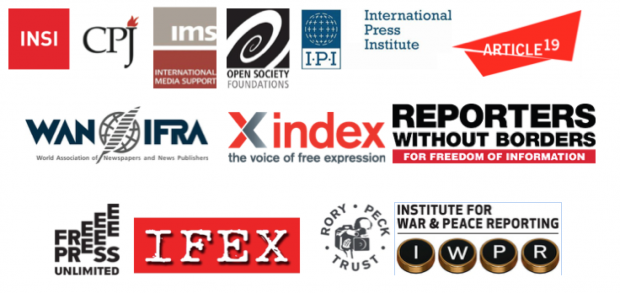
In response to the attacks on Tolo TV on 20 January, in which eight people have been killed and 30 others injured, we stand in solidarity with the Afghan media community. We condemn this and all other attacks on Afghanistan’s journalists unreservedly and applaud their courage to stand together undeterred by those who seek to silence them. We want to tell our colleagues throughout Afghanistan they are not alone; the international community is behind them. The journalists and media workers of Afghanistan are playing a leading role in working fearlessly to ensure that the voices of violent extremists do not dominate the news agenda. We remain ready to help them in this perilous endeavour.
Signed by (and including links to additional statements on the Tolo attack from these organizations),
Article 19, UK
Committee to Protect Journalists, USA
Free Press Unlimited, Netherlands
Index on Censorship, UK
Institute for War and Peace Reporting, UK
International Freedom of Expression Exchange (IFEX), Canada
International News Safety Institute UK
International Media Support, Denmark
International Press Institute, Austria
World Association of Newspapers, France
Open Society Foundations, Program on Independent Journalism, UK
Reporters Without Borders, France
Rory Peck Trust, UK
Joint statement on death sentence of Palestinian poet Ashraf Fayadh
27 Nov 2015 | Campaigns, Middle East and North Africa, mobile, Palestine, Statements
We, the undersigned organisations, all dedicated to the value of creative freedom, are writing to express our grave concern that Ashraf Fayadh has been sentenced to death for apostasy.
Ashraf Fayadh, a poet, artist, curator, and member of British-Saudi art organisation Edge of Arabia, was first detained in August 2013 in relation to his collection of poems Instructions Within following the submission of a complaint to the Saudi Committee for the Promotion of Virtue. He was released on bail but rearrested in January 2014.
According to court documents, in May 2014 the General Court of Abha found proof that Fayadh had committed apostasy (ridda) but had repented for it. The charge of apostasy was dropped, but he was nevertheless sentenced to four years in prison and 800 lashes in relation to numerous charges related to blasphemy.
At Ashraf Fayadh’s retrial in November 2015 the judge reversed the previous ruling, declaring that repentance was not enough to avoid the death penalty. We believe that all charges against him should have been dropped entirely, and are appalled that Fayadh has instead been sentenced to death for apostasy, simply for exercising his rights to freedom of expression and freedom of belief.
As a member of the UN Human Rights Council (HRC), the pre-eminent intergovernmental body tasked with protecting and promoting human rights, and the Chair of the HRC’s Consultative Group, Saudi Arabia purports to uphold and respect the highest standards of human rights. However, the decision of the court is a clear violation of the internationally recognised rights to freedom of conscience and expression. Article 18 of the Universal Declaration of Human Rights (UDHR) states that, “[e]veryone has the right to freedom of thought, conscience and religion; this right includes freedom to change his religion or belief”. Furthermore, under Article 19 of the Universal Declaration of Human Rights, “everyone has the right to freedom of opinion and expression; this right includes freedom to hold opinions without interference and to seek, receive and impart information and ideas through any media and regardless of frontiers”. Saudi Arabia is therefore in absolute contravention of the rights that as a member of the UN HRC it has committed to protect.
There are also widespread concerns over an apparent lack of due process in the trial: Fayadh was denied legal representation, reportedly as a result of his ID having been confiscated following his arrest in January 2014. It is our understanding that Fayadh has 30 days to appeal this latest ruling, and we urge the authorities to allow him access to the lawyer of his choice.
We call on the Saudi authorities to release Ashraf Fayadh and others detained in Saudi Arabia in violation of their right to freedom of expression immediately and unconditionally.
List of signatories:
AICA (International Association of Art Critics)
Algerian PEN
All-India PEN
Amnesty International UK
Arterial Network
ARTICLE 19
Artists for Palestine UK
Austrian PEN
Banipal
Bangladesh PEN
Bread and Roses TV
British Humanist Association
Bulgarian PEN
Centre for Secular Space
CIMAM (International Committee for Museums and Collections of Modern Art)
Council of Ex-Muslims of Britain
Croatian PEN
Crossway Foundation
Danish PEN
English PEN
Ethiopian PEN-in-Exile
FIDH (International Federation for Human Rights)
Five Leaves Publications
Freemuse
German PEN
Haitian PEN
Human Rights Watch
Index on Censorship
International Humanist and Ethical Union
Iranian PEN in Exile
Jimmy Wales Foundation
Lebanese PEN
Ledbury Poetry Festival
Lithuanian PEN
Modern Poetry in Translation
National Coalition Against Censorship (NCAC)
Norwegian PEN
One Darnley Road
One Law for All
Palestinian PEN
PEN American Center
PEN Canada
PEN International
PEN South Africa
Peruvian PEN
Peter Tatchell Foundation
Portuguese PEN
Québec PEN
Russian PEN
San Miguel PEN
Scottish PEN
Slovene PEN
Society of Authors
South African PEN
Split This Rock
Suisse Romand PEN
School of Literature, Drama and Creative Writing, University of East Anglia
The Voice Project
Trieste PEN
Turkish PEN
Wales PEN Cymru

